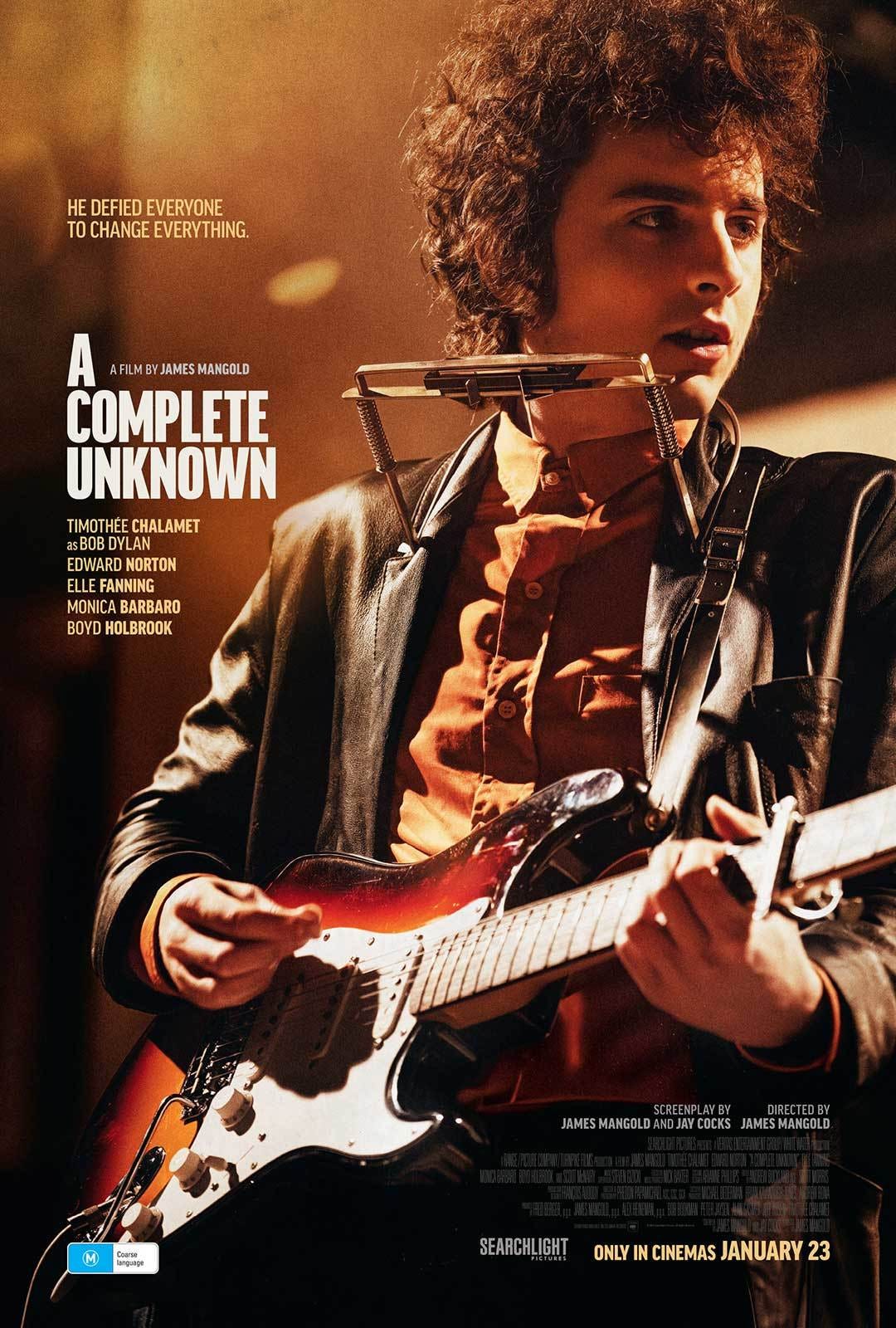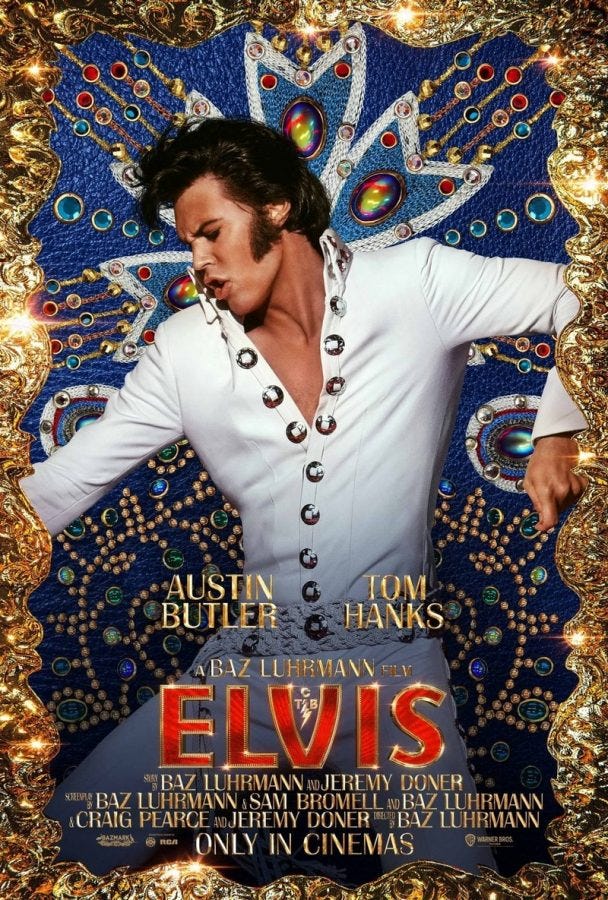Bobby's Still an Enigma in "A Complete Unknown"
The new James Mangold-directed Bob Dylan biopic could aptly be summed up as "Portrait of a folk artist [who resisted being defined as such] as a young man."
Bob Dylan, the only musician to ever win a Nobel Prize for Literature (2016) and the focus of Director James Mangold’s (Walk the Line) new biopic, is known for being a reclusive, private person who toes the line between eccentricity and cool, genius musician like a trapeze artist walking a 40 ft. high thin wire. In both scenarios, you watch precariously with bated breath for the next move, wondering if it might be the artist’s last, but unable to look away for fear of missing a moment. Such is the somewhat wild ride that echos both the artist and the new film about his formative, early years in the early-to-mid 60s, which charts his rise to stardom.
In A Complete Unknown [Trailer], a line aptly referencing a lyric from Dylan’s iconic song, “Like a Rolling Stone,” one of the big talents of his generation, Timothée Chalamet, transforms himself from the shy yet confident Robert Allen Zimmerman from Minnesota, into Greenwich Village folk/blues/rock star Bob Dylan, the harmonica-toting, sunglass-wearing-at-all-times wunderkind with a nasal, raspy voice, whose eloquence at speaking truth to the social and political unrest around him, won the hearts of Americans for generations, myself included.
Track Some Mud on the Carpet
One of the major points Mangold makes in his film is that Dylan is and will always be a bit of a puzzle. In the film, we witness his remarkable, chameleon-like ability to reinvent his music in such a brief span that it would leave even Taylor Swift's Eras feeling envious. Music reinvention is one thing, though. For Dylan, penetrating beneath his layers was never on the table, though, try as the media has. His music was and is the window into his soul. It’s ALL that we get, and I think Mangold is making a point of saying that. Some critiques of this film have alluded to the inability to delve deeper into Dylan’s psyche and his past as a weakness on the part of the film’s script and material Chalemet is working with. However, I believe Mangold’s decision to let the music convey Dylan's essence is a wise one. This approach also feels refreshing, as it diverges from the pervasive overexposure of today’s celebrity culture, potentially making a statement through its very absence.
On the topic of self-reinvention, there are clever nods to the popular film classic Now Voyager (1942) and actress Bette Davis’s own reinvention origin story, with Dylan, in a telling scene with love interest Sylvie Russo (Elle Fanning), relaying to her his philosophy of what it takes to stand out from the crowd:
You can be beautiful, or you can be ugly, but you can’t be plain. You gotta be someone people want to look at. I want to be weird. I want to be a freak. - Bob Dylan
In the film’s portrayal, Dylan is a man consumed by music and inspired to evolve his own by other artists of the day, like folk’s forefathers and guardians, Pete Seeger (Ed Norton) and Woody Guthrie (Scoot McNairy) and the other side of the spectrum, Johnny Cash (Boyd Holbrook), who defied categorization, with his mixing of country, blues, folk, gospel, rockabilly, rock 'n' roll, and rock. He’s also a young man on the precipice of greatness, and it’s palpable in the film; even in scenes where he's just playing for fun, he’s baring his soul and existing on a higher plane with his art that most can’t deign to touch. When we see Ed Norton’s Seeger watching a pre-famous Dylan strum a tune, his look of wonder and awe reflects our own. Similarly, when Fanning’s Russo fights with him, telling him she knows nothing about “the real him,” it’s as if she’s our voice, his audience.
Cause you’re pushing candles, and he’s selling light bulbs.- Dylan’s manager on what Dylan is offering vs. Pete Seeger’s folk dinosaur
Love & Youth
While Dylan may seek female companionship in the sheets in his relationships with his long-term first love, Sylvia Russo (based on Suze Rotolo), and experience charged emotions from his more fraught creative love match with Joan Baez (played beautifully by Monica Barbaro), his heart (and soul) is always somewhere entrenched deep in that guitar.
There’s a universality to being young, dumb, and broke. The singer, Khalid, not a protege of Dylan’s as far as I know, sang about this in a really catchy tune. This sentiment is on full display in the film’s first act in Dylan’s behaviors. In his real life, Dylan has admitted to making plenty of mistakes when it comes to his past relationships, and there are likely things he would change if he could go back, including the 1964 “Ballad in Plain D” about the decline of his relationship with Suze Rotolo in which he lashes out at her family, singing of Suze’s sister:
For her parasite sister, I had no respect
Bound by her boredom, her pride to protect
Countless visions of the other she’d reflect
As a crutch for her scenes and her society
The film spends quite a bit of time on the spark and volatility of the Baez-Dylan coupling. Given how magnetic the chemistry is between the actors, it works, especially at the relationship’s demise when they sing together cathartically, It Ain’t Me Babe [Watch the real-life live performance of them at the 1964 Newport Folk Festival]
Side Note: It would have been great to see some of the original Newport Folk Festival concert footage included in the film's credits.
Giving Proper Props
Timothée Chalamet's performance as Bob Dylan is quite good. He pre-recorded all the music here, too, and there’s much of it. Dylan isn’t known for his vocal talents outright, but he has a signature style, and it’s felt here.
Monica Barbaro as Joan Baez is memorable. It’s a tough role to live up to, and she carries the weight of that with the right amount of gravitas and levity. Plus, her singing of Guthrie’s "The House of the Rising Sun,” is outstanding.
Dan Fogler as Albert Grossman, Dylan’s manager. Everything about his performance was stellar. He could have easily been reduced to a villain cartoon-type character, but he’s more than that here. He sees Dylan’s potential and encourages him to pursue his music.
Boyd Holbrook as Johnny Cash. Holbrook can do no wrong. He’s got the scene-stealing swagger, unpolished irreverence, and vulnerability firing on all cylinders here. He even acts the part of pen pal Big Brother, consoling Bob Dylan, on the pitfalls of fame and a lack of anonymity. The best line of the film, and what proves to be the most inspirational for Dylan, belongs to him, “Track some mud on the carpet.” That’s going to be my mantra from now on or at least until the end of 2024.
Summary - Like a Rolling Stone, No Direction Home
The film has a few acts. My favorite is definitely the first one, and 10 minutes into the final act. This is true to my nature, as well. I need to know how a story ends before I commit to it. Some of the time spent paying respects to forefathers of folk like Guthrie, who in the film is confined to a non-speaking role, given the advanced state of his Huntington’s Disease, which I mistakingly thought was a result of advanced lung cancer, given his proclivity for smoking, was touching. Seeger helping bring Dylan up in the world, was noteworthy too. Mentors matter, and this film does an impressive job of demonstrating that. The second act trappings of crippling fame on an artist’s sensibilities theme and everyone, including Seeger, acting predatorily, sucking on the tit of Dylan’s fame, felt gross, but likely true to life. Dylan rebelling against the establishment and joining forces with other music outlaws, or at least artists exploring different, less mainstream genres, maps to the evolution of his journey as an artist. In the end though, all of these musicians are getting by with a little help from a friend. That’s just the nature of the biz. And dare I say, life, too.
Hot Takes on Substack Notes After I Saw The Film
Spoiler alert: Dylan eventually succumbed to a motorcycle accident, unfortunately.
Update: Still listening to this
The Anti-Golden Globe Awards
Cast your vote for the top 2024 TV and film performances here
The big winners’ reveal will be on January 4th.
Twin Films - MUSIC Themed Fun
For January’s Film Chat, we’ll discuss “Twin Films,” which refer to films with the same or similar plots released at different studios at different times.*
In January, we will discuss Baz Luhrmann’s Elvis (2022) and Sofia Coppola’s Priscilla (2023).
A special thank you to Searchlight Pictures for the advanced screening of this film.










You had me at Dylan. Sounds like a great film. Wonderful article. I can imagine you in the theatre taking notes.
The Free Press recently posted a wonderful article written by Douglas Murray about Dylan winning the Nobel.
I was waiting for your take on this film. I'm driving into the city to watch it tomorrow and am so curious/nervous whether I'll like it or not.